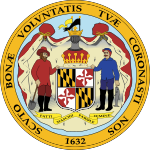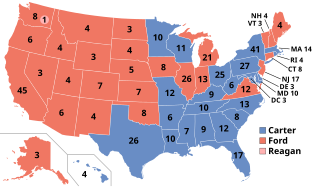| | ||||||||||||||||
| ||||||||||||||||
| ||||||||||||||||
| ||||||||||||||||
The 1935 Baltimore mayoral election saw the reelection of Howard W. Jackson for a second consecutive and third overall term.
| | ||||||||||||||||
| ||||||||||||||||
| ||||||||||||||||
| ||||||||||||||||
| Elections in Maryland |
|---|
 |
The 1935 Baltimore mayoral election saw the reelection of Howard W. Jackson for a second consecutive and third overall term.
The general election was held May 7. [1]
| Party | Candidate | Votes | % | |
|---|---|---|---|---|
| Democratic | Howard W. Jackson (incumbent) | 114,321 | 60.27% | |
| Republican | Blanchard Russell, Jr. | 75,368 | 39.73% | |
| Total votes | 189,689 | |||

An election is a formal group decision-making process whereby a population chooses an individual or multiple individuals to hold public office.

The Republican Party, also known as the Grand Old Party (GOP), is one of the two major contemporary political parties in the United States. It emerged as the main political rival of the then-dominant Democratic Party in the 1850s, and the two parties have dominated American politics since then.

Presidential elections were held in the United States on November 2, 1976. The Democratic ticket of Jimmy Carter, the former governor of Georgia, and his runningmate Walter Mondale, the senior senator from Minnesota, narrowly defeated the Republican ticket of Gerald Ford, the incumbent president, and his runningmate Bob Dole, the junior senator from Kansas. This was the first presidential election since 1932 in which the incumbent was defeated, as well as the only Democratic victory of the six presidential elections between 1968 and 1988.

The Knesset is the unicameral legislature of Israel.

The incumbent is the current holder of an office or position. In an election, the incumbent is the person holding or acting in the position that is up for election, regardless of whether they are seeking re-election.

Presidential elections were held in the United States on November 4, 2008. The Democratic ticket of Barack Obama, the junior senator from Illinois, and Joe Biden, the senior senator from Delaware, defeated the Republican ticket of John McCain, the senior senator from Arizona, and Sarah Palin, the governor of Alaska. Obama became the first African American to be elected to the presidency. This was the first election since 1952 in which neither the incumbent president nor vice president was on the ballot, as well as the first election since 1928 in which neither ran for the nomination.

Presidential elections were held in the United States on November 2, 2004. Incumbent Republican President George W. Bush and his running mate, incumbent Vice President Dick Cheney, were re-elected to a second term. They narrowly defeated the Democratic ticket of John Kerry, a senator from Massachusetts, and his running mate John Edwards, a senator from North Carolina.
An independent politician or non-affiliated politician is a politician not affiliated with any political party or bureaucratic association. There are numerous reasons why someone may stand for office as an independent.

Donald John Trump is an American politician, media personality, and businessman who has served as the 47th president of the United States since January 20, 2025. A member of the Republican Party, he previously served as the 45th president from 2017 to 2021.
The Labour Party is a political party in the United Kingdom that sits on the centre-left of the political spectrum. The party has been described as an alliance of social democrats, democratic socialists and trade unionists. It is one of two dominant political parties in the United Kingdom, along with the Conservative Party. The party has been led by Keir Starmer since 2020. Starmer became UK Prime Minister and formed a Labour government following the 2024 general election. To date, there have been thirteen Labour governments and seven Labour prime ministers - MacDonald, Attlee, Wilson, Callaghan, Blair, Brown and Starmer.

Presidential elections were held in the United States on November 6, 2012. Incumbent Democratic President Barack Obama and his running mate, incumbent Vice President Joe Biden, were elected to a second term. They defeated the Republican ticket of former Governor of Massachusetts Mitt Romney and U.S. Representative Paul Ryan of Wisconsin, who later became Speaker of the House of Representatives.

Presidential elections were held in the United States on November 8, 2016. The Republican ticket of businessman Donald Trump and Indiana governor Mike Pence defeated the Democratic ticket of former secretary of state and former first lady Hillary Clinton and Virginia junior senator Tim Kaine, in what was considered one of the biggest political upsets in American history. It was the fifth and most recent presidential election in which the winning candidate lost the popular vote. It was also the sixth and most recent presidential election in U.S. history in which both major party candidates were registered in the same home state, the others being 1860, 1904, 1920, 1940 and 1944, with both nominees having been registered in New York.

The United States Senate is the upper chamber of the United States Congress. The Senate and the United States House of Representatives comprise the federal bicameral legislature of the United States. Together, the Senate and the House have the authority under Article One of the U.S. Constitution to pass or defeat federal legislation. The Senate has exclusive power to confirm U.S. presidential appointments to high offices, and approve or reject treaties, and try cases of impeachment brought by the House. The Senate and the House provide a check and balance on the powers of the executive and judicial branches of government.

Presidential elections were held in the United States on November 3, 2020. The Democratic ticket of former vice president Joe Biden and the junior U.S. senator from California Kamala Harris defeated the incumbent Republican president Donald Trump, and vice president Mike Pence. The election took place against the backdrop of the global COVID-19 pandemic and related recession. The election saw the highest voter turnout by percentage since 1900. Biden received more than 81 million votes, the most votes ever cast for a presidential candidate in U.S. history.

The 2024 United States elections were held on Tuesday, November 5, 2024. In the presidential election, former Republican President Donald Trump, seeking a non-consecutive second term, defeated the former Democratic Vice President Kamala Harris. Republicans also gained control of the Senate and held narrow control of the House of Representatives, winning a government trifecta for the first time since 2016.

The 2024 United States Senate elections were held on November 5, 2024. Regularly scheduled elections were held for 33 out of the 100 seats in the U.S. Senate, and special elections were held in California and Nebraska. U.S. senators are divided into three classes whose six-year terms are staggered so that a different class is elected every two years. Class 1 senators faced election in 2024. Republicans flipped four Democratic-held seats, regaining a Senate majority for the first time in four years, and the most gains since 2014.

Presidential elections were held in the United States on November 5, 2024. The Republican Party's ticket—Donald Trump, who was the 45th president of the United States from 2017 to 2021, and JD Vance, the junior U.S. senator from Ohio—defeated the Democratic Party's ticket—Kamala Harris, the incumbent vice president, and Tim Walz, the 41st governor of Minnesota. Trump and Vance were inaugurated as the 47th president and the 50th vice president, respectively, on January 20, 2025.

The 2026 United States Senate elections are scheduled to be held on November 3, 2026, with 33 of the 100 seats in the Senate being contested in regular elections, the winners of which will serve six-year terms in the United States Congress from January 3, 2027, to January 3, 2033. Senators are divided into three groups, or classes, whose terms are staggered so that a different class is elected every two years. Class 2 senators were last elected in 2020 and will be up for election in this cycle.

The 2024 United States House of Representatives elections were held on November 5, 2024, to elect the 435 representatives of the United States House of Representatives, as well as 6 non-voting delegates from the District of Columbia and inhabited U.S. territories. The elections were held together with other federal, state, and local elections, including the U.S. presidential election and elections to the Senate, as part of the 2024 United States general election. The winners of this election will serve in the 119th United States Congress, with seats apportioned among states based on the 2020 United States census.